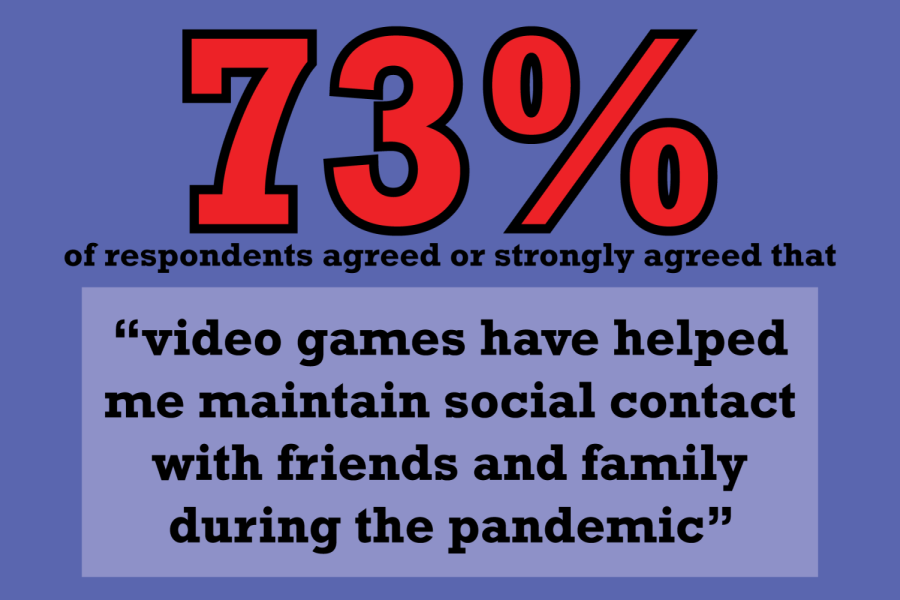Fordham Gamers and Streamers Stay Connected During the Pandemic
A majority of surveyed students said video games helped them cope with social distancing
Almost three quarters of survey respondents in the Fordham community linked their use of video games to maintaining social contact during the pandemic.
January 3, 2022
A majority (76%) of Fordham’s gamers are playing their favorite titles to cope with the stress caused by the COVID-19 pandemic, according to a recent Fordham Observer survey. The survey was conducted between October and November of 2021. Respondents included 24 students at Fordham Lincoln Center, five from Fordham Rose Hill and one alum.
The survey found that nine out of 10 respondents said they increased their video game usage during the COVID-19 pandemic.
The median respondent said they play video games one to three hours per day on average, both on weekdays and weekends. In general, gamers play an average of eight hours and 27 minutes per week, according to TechRepublic.
Gaming has had a positive impact on people’s lives, including “providing cognitive stimulation and opportunities to socialise.”
When asked to react to the statement “video games have helped me maintain social contact with friends and family during the pandemic,” 73% of respondents either strongly agreed or agreed.
The results coincide with a larger study by Matthew Barr and Alicia Copeland-Stewart published in “Games and Culture.” The researchers found that 71% of respondents played video games more often during COVID-19 lockdowns and that 58% of respondents claimed their well-being was affected by video games, “with the overwhelming majority of responses indicating a positive impact.”
The Barr and Copeland-Stewart study identifies several ways that gaming has had a positive impact on people’s lives, including “providing cognitive stimulation and opportunities to socialise.”

Fordham Students Weigh In
Anton Karabushin, Fordham College at Lincoln Center ’25, said he depended on video games to fight boredom during the pandemic. He first played “Red Dead Redemption 2” during the most harrowing days of 2020, and today he remembers it as “a masterpiece of an open-mapped game.”
Throughout the pandemic, Karabushin’s mental health remained relatively stable for “a lot of different reasons,” but “video games were a net positive for me.”
“Even though I was slumped over on my couch not moving my muscles except my fingers, it was a good thing for me,” Karabushin said. “I got to play with my friends online and had so many experiences from video games I wouldn’t otherwise have had a chance to.”
This sentiment was true for other survey respondents as well. One respondent cited playing through all eight games in the Yakuza series in one year and keeping in touch with friends on Animal Crossing and Among Us as crucial to getting them through the pandemic.
“I don’t know how I would have gotten through the pandemic without video games,” the respondent said. “Video games had more of an impact on me during quarantine than they ever did before.”
Streaming to a Remote Community
Valerie Palladino, Fordham College at Rose Hill ’24, opened up about their experience as a video game streamer during the COVID-19 pandemic.
“Like anything, there’s pros and cons with it,” Palladino said. The survey found similar results, with fewer than a quarter of respondents reportedly finding video games to be not helpful or “neutral” in coping with stress. To Palladino, video games and streaming were good distractions but limited their typical exercising routine, so they decided to play standing up. It wasn’t much of a distraction for them to “pace in place,” helping them to focus better.
Surprisingly, streaming didn’t seem to mentally fatigue Palladino, perhaps due to the recreational nature of the games they enjoy. Many of their favorites are story progression games such as “Super Mario Odyssey,” “Hades” and “Okami.”
77% discovered new enjoyable games, while 17% did not.
The survey results revealed interesting habits of discovering new games or seeking comfort in known favorites. For example, 63% of surveyed respondents mostly played old favorite games, while 20% did not. Similarly, 77% discovered new enjoyable games, while 17% did not.
Growing up on the DS Lite and the Wii, Palladino has always been more of a Nintendo fan. Casual games such as the latest rendition of “Super Mario Party” are also within their scope of streams. YouTubers and other online personalities introduced them to newer games, but they primarily stick to their beloved classics.
Palladino utilizes Twitch, streaming without monetization primarily because of a lack of an established base. Streaming once a week does not afford itself much of a crowd. Still, they stay in “the know” with other streamers like SmallAnt, RTGame, Ludwig and DougDougW.
The survey also found 73% to have viewed video games as helpful in maintaining social contact, with 17% that did not. Palladino falls in the majority as she used Discord to keep in touch and play with friends, both from school and online forums.
At the forefront of the streaming experience is enjoyment. Palladino searches for a middle ground where they will enjoy themself as well as entertain their audience, which they assert is a struggle even for larger content creators. Tagging and fitting into specifically curated Twitch categories can be troublesome.
“Speedrunning” is just one of the many categories they choose when streaming. Palladino sometimes specifies their speedruns with a twist — a “punishment wheel,” which is a spinning wheel that dictates additional challenges onto the streamer for every reset or death. Other categories are more relaxed, such as “Music” or “Just Chatting.”
“What I try to do is find stream ideas that are both engaging for the viewer and also are relatively easy on time and effort from my side of things.” Valerie Palladino, FCRH ’24
“I see (streaming) as a hobby,” Palladino said. “What I try to do is find stream ideas that are both engaging for the viewer and also are relatively easy on time and effort from my side of things.” Academics are priority number one for the sophomore undergrad. “Hopping” into streams every Thursday for three or four hours sometimes takes a necessary backseat.
Regarding their undeveloped base, they are relatively carefree: “If people want to join me, that’s great. If not, that’s okay too.”
An easygoing attitude is just what’s needed during the COVID-19 pandemic. Providing an outlet for the stress, Palladino plans to continue their streaming career in the hopes of possibly using it as a “side-gig.”
Video Games and Mental Health
Jeffrey Ng, director of Counseling and Psychological Services (CPS) at Rose Hill and Lincoln Center, pointed to the decreased social contact due to quarantine and isolation practices during the pandemic as reasons for the increased anxiety, among other factors.
“The combination of grief, anxiety and loneliness is not the best recipe for mental health,” he said.
Ng, who is a “casual gamer” himself, found playing video games to be a helpful activity for stress relief and social contact during the pandemic.
“It doesn’t require in-person contact, but it still allows us to connect with others,” he said.
“While personal interactions through gaming can be helpful, they’re not sufficient.” Jeffrey Ng, director of CPS
Considering the 10% of survey respondents who felt gaming worsened their stress, Ng added that not all types of social contact can be achieved through screens. “One of the needs we have as human beings is relational contact,” he said. “Perhaps some folks who are gaming extensively are feeling the effects of not having face-to-face in-person contact. While personal interactions through gaming can be helpful, they’re not sufficient.”
Fordham gamers persisted through a global pandemic by relying on video games to form their sense of community. Whether it is connecting with friends like Karabushin or creating a community through streaming like Palladino, video games proved to be more than just “mindless entertainment” for many.
The Centers for Disease Control and Prevention recommends a variety of ways to cope with pandemic-related stress, including social actions such as talking with others about your feelings and connecting with community and faith-based organizations. Gaming is just one way that people can cope with stress while in pursuit of cooperative fun, competition and togetherness in the face of the pandemic.



















